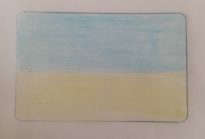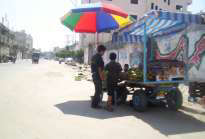Radio Hayah spoke with Amer, the manager of the research and curriculum department Nazareth Village: Experiencing what it was like in Jesus' time.
Radio Hayah spoke with Amer, the manager of the research and curriculum department Nazareth Village: Experiencing what it was like in Jesus' time
Based on solid New Testament scholarship and the most up-to-date archaeology, Nazareth Village brings to life a farm and Galilean village, recreating Nazareth as it was 2,000 years ago. Radio Hayaah spoke with Amer, the manager of the research and curriculum department.
Radio Hayah : What is the Nazareth Village?
Amer: The Nazareth village is a co-operative project for Christians from all over the world. The idea is to create a living pattern of a village at the time of Jesus in order that visitors to the Holy Land can understand how life looked like and how Jesus used living patterns in order to form his message, his parables and stories.
Radio Hayah : What can you see here today?
Amer: Today visitors will experience life in Jesus' time. They will see a created village with houses, synagogue and olive press, built using the same kind of materials that they had back then; the same styles exactly and also people. Villagers will be dressing in the same kind of clothes as the first century, showing and living the life. The visitor will experience going back 2000 years and living at the time of Jesus.
We are following the seasons here too. What I mean by that is in different times of the year visitors that come can experience different things, because the farmer experiences different things during the year. In the winter he had to plough the fields and prepare the land and sowing the seeds; in the spring the wheat and keep them till the harvest time. In the summer the visitors that come will see us doing the harvest and threshing the wheat and in the autumn we pick the olives and press them in the olive press we have here. So in different times of the year you see different things.
Radio Hayah: It is autumn now and the olives are ripe and being squashed. How did they do it in Jesus' time?
Amer: Today we are operating our olive press and it is an exact replica to the one that was found in Gamla from the time of Jesus. We press using the old techniques, which is three stages that the olives have to pass. First of all they have to be ground with a grinding stone that the donkey would push.
Radio Hayah : Do you actually have a live donkey there today?
Amer: Yes sure, this is the first step. Then they would collect the ground pulp into baskets and take them to the press, which is a kind of wooden beam. It is very heavy and it would lie on the baskets. The baskets are made of palm branches, so they allow the liquid to pass through. The pulp would stay inside the basket, but the oil would flow out and be collected underneath the baskets where there is a collecting hole. Then the third step is to collect the oil by a vessel and separate the oil from the water because olives also have water in them. Since the water is heavier the oil is going to be floating on top so they just scoop it out from the top and that's all.
Radio Hayah : And this is the same as Jesus would have done in his day?
Amer: Exactly.
Radio Hayah : And you have a wine press as well, how did they do the wine in Jesus' day?
Amer: The wine press is first century, it's not a replica. It's a different time of year when the grape would be ripe. It's in the summer time July and August. First of all the wine press is in two parts; the upper part is kind of a basin which leads up through a channel into a collecting vat. Now what they need to do is harvest the grapes and put them on the upper part, the basin and then they would take their sandals away and just walk on the grapes; step on them with bare feet. They will press the grapes and the juice will flow down through the channel which connects the basin into the lower vat. All the juice will be collected into the lower vat. Then they would scoop them out and ferment them into wine.
Radio Hayah : Does all this help you to understand more of the Bible, as you read the word and see what Jesus was talking about?
Amer: Exactly. For example you just asked me about the wine press; in our vineyard here we found terraces around the vineyard and they are from the time of Jesus. We found pottery pieces from the time of Jesus. So we have the vineyard which they had back then and because of the existence of the wine press it tells us that they had grown here grapes, so there was a vineyard here. There was a wall around the vineyard. There was a wine press and a fourth thing that we found is a base for a first century tower from the time of Jesus. Now if we remember one of Jesus' parables, Mark chapter 12:1 Jesus says, 'A man planted a vineyard, he surrounded that vineyard with a wall and he dug a hole for the wine press and he built a watch tower'. This is exactly what was described back then. It's not something that we created; it's just something that we found here which fits exactly the scripture that Jesus spoke about.
What is unique about our land is the fact that it is about 500 metres away from where Jesus lived, so he will have seen this land and would have been speaking about this land or a very similar one.
Radio Hayah : I imagine you had to do a lot of research to establish this village?
Amer: Sure, we had started with research and we continue with research. We started with research by doing the research about how life was like in Nazareth and in general in the Holy Land at that time in different aspects; political, religious, social, craft and food and clothing. We established Nazareth Village according to this research and according to the archaeological findings.
Our archaeologists used to go and visit remains of ruins from the first century to build our buildings based on their findings. Now all the time we continue with ongoing research in order to develop this village more and more. A few months ago we have established a new department, which I am the manager of, which is the research and curriculum department. We have started to develop curriculum which is going to go to theological colleges all over the world, so that they can study the parables based on the land and what Jesus and the citizens saw. Also some of the research is going to be published on our website. People who are interested can visit the website and order some of the curriculum.
Radio Hayah: Was life difficult two thousand years ago?
Amer: In terms of today yes, with the lack of all the equipment, the machines and everything. They would get up very early in the morning around 4am and then start to work all day beginning with the women grinding grain and making bread and preparing food and going with their families out to the field or to the work that they do. They would stay all day long and come back almost at sunset, so it was a life of work. They didn't have the time just to hang around.
Radio Hayah : What's it like for you coming to the village every morning to work; coming to Jesus' time and going back in history?
Amer: I was the first guy who started to work here in the village and when we had just opened to the public the first time, we had the villagers in their homes imitation like the real life and doing things and speaking with each other. I was guiding a tour and I get to one of the houses and I had to choke myself, even though I knew what was going to be there, but for one moment I had a shock and thought wow its real life; it's captured me. It was like me going back to the first century. I have imagined Jesus wandering around here many times in the village.
Radio Hayah : How many visitors do you get here a year?
Amer: We have around sixty to seventy thousand people every year, which is not bad but still not enough.
Radio Hayah : Do you get many local people visiting?
Amer: Sure we get a lot of local people visiting; also school children, Jewish and Arabs, Christians and Muslims.
Radio Hayah : With everything you see here does it really show the heart of Jesus and who he was?
Amer: Sure in everything we do here we want to reflect Jesus and reflect the life he experienced and the teachings he taught; the parables and the stories and also the behaviour. We just want people to experience that this is a place that speaks about Jesus, not only by the mouth but also by behaviour.
Radio Hayah: And you have a website for people who would like to know more?
Amer: Yes, it's www.nazarethvillage.com
 صوت راديو الحياة
صوت راديو الحياة
 العيش في زمن الحرب مقابلة راديو حياة مع منظمة شباب مع مهمة من كييف YWAM – الجزء الثاني
العيش في زمن الحرب مقابلة راديو حياة مع منظمة شباب مع مهمة من كييف YWAM – الجزء الثاني
 الكنيسة في غزة – الجزء الثاني
الكنيسة في غزة – الجزء الثاني